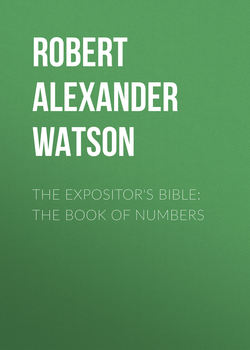Читать книгу The Expositor's Bible: The Book of Numbers - Robert Alexander Watson - Страница 17
VII
THE CLOUD AND THE MARCH
2. The Silver Trumpets
ОглавлениеNumbers x. 1-10
An air of antique simplicity is felt in the legislation regarding the two trumpets of silver, yet we are not in any way hindered from connecting the statute with the idea of claiming human art for Divine service. Instrumental music was of course rudimentary in the wilderness; but, such as it was, Jehovah was to control the use of it through the priests; and the developed idea is found in the account of the dedication of the temple of Solomon, as recorded in 2 Chron. v., where we are told that besides the Levites, who had cymbals, psalteries, and harps, a hundred and twenty priests sounding with trumpets took part in the music.
There is no need to question the early use of these instruments; nevertheless, the legislation in our passage assumes the settlement in Canaan, and times when defensive war became necessary and the observance of the sacred feasts fell into a fixed order. The statute is instructive as to the meaning of the formula "The Lord spake unto Moses," and not less as to the gradual accretion of particulars around an ancient nucleus. We cannot set aside the sincere record, though it may seem to make Jehovah speak on matters of small importance. But interpretation must spring from a right understanding of the purpose suggested to the mind of Moses. Uses found for the trumpets in the course of years are simply extensions of the germinal idea of reserving for sacred use those instruments and the art they represented. It was well that whatever fear or exhilaration the sounding of them caused should be controlled by those who were responsible to God for the moral inspiration of the people.
According to the statute, the two trumpets, which were of very simple make, and capable of only a few notes, had their use first in calling assemblies. A long peal blown on one trumpet summoned the princes who were the heads of the thousands of Israel: a long peal on both trumpets called the whole congregation to the "tent of meeting." There were occasions when these assemblies were required not for deliberation, but to hear in detail the instructions and orders of the leader. At other times the convocations were for prayer or thanksgiving; or, again, the people had to hear solemn reproofs and sentences of punishment. We may imagine that with varying sound, joyful or mournful, the trumpets were made to convey some indication of the purpose for which the assembly was called.
A sacred obligation lay on the Israelites to obey the summons, whether for joy or sorrow. They heard in the trumpet-blast the very voice of God. And upon us, bound to His service by a more solemn and gracious covenant, rests an obligation even more commanding. The unity of the tribes of Israel, and their fellowship in the obedience and worship of Jehovah, could never be of half so much importance as the unity of Christians in declaring their faith and fulfilling their vocation. To come together at the call of recurring opportunity, that we may confess Christ and hear His word anew, is essential to our spiritual life. Those who hear the call should know its urgency and promptly respond, lest in the midst of the holiest light there come to be a shadow of deep darkness, the midnight gloom of paganism and death.
Again, in the wilderness, the trumpets gave the signal for striking the camp and setting out on a new stage of the journey. Blown sharply by way of alarm, the peals conveyed now to one, now to another part of the host the order to advance. The movement of the pillar of cloud, we may assume, could not be seen everywhere, and this was another means of direction, not only of a general kind, but with some detail.
Taking vv. 5, 6, along with the passage beginning at ver. 14, we have an ideal picture of the order of movement. One peal, sharply rung out from the trumpets, would signify that the eastern camp, embracing the tribes of Judah, Issachar, and Zebulun, should advance. Then the tabernacle was to be taken down, and the Levites of the families of Gershon and Merari were to set forward with the various parts of the tent and its enclosure. Next two alarms gave the signal to the southern camp, that of Reuben, Simeon, and Gad. The Levites of the family of Kohath followed, bearing the ark, the altar of incense, the great altar, the table of shewbread, and other furniture of the sanctuary. The third and fourth camps, of which Ephraim and Benjamin were the heads, brought up the rear. In these movements the trumpets would be of much use. But it is quite clear that the real difficulty was not to set the divisions in motion each at a fit time. The camps were not composed only of men under military discipline. The women and children, the old and feeble, had to be cared for. The flocks and herds also had to be kept in hand. We cannot suppose that there was any orderly procession; rather was each camp a straggling multitude, with its own delays and interruptions.
